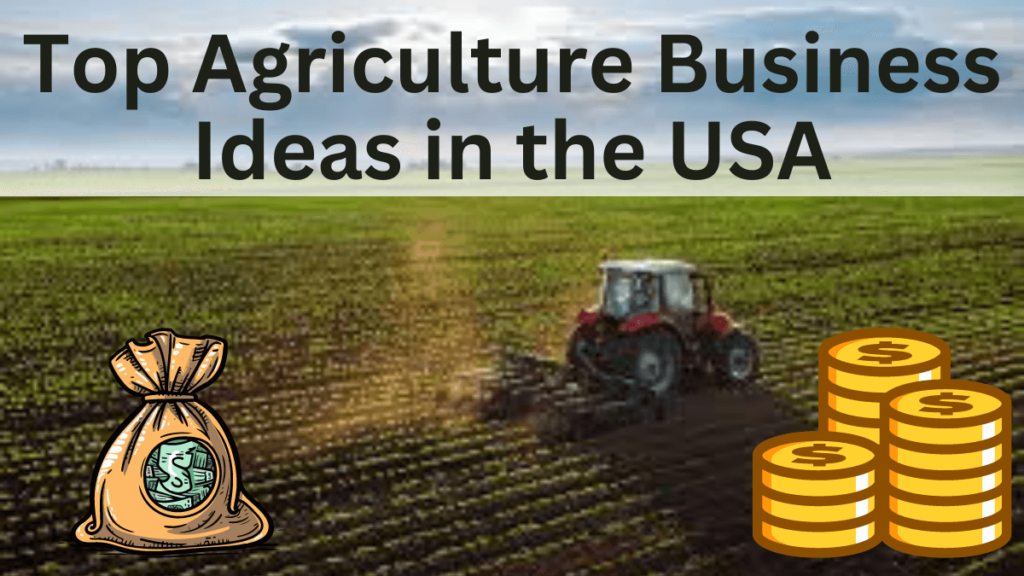Farming has evolved into a significant source of income, attracting individuals not only for its profitability but also for the health benefits, peace, and tranquility it offers. The agriculture industry in the USA is continuously growing, driven by new technologies and changing consumer preferences. Whether you’re an aspiring entrepreneur or a seasoned farmer looking to diversify, the following top agriculture business ideas provide a lucrative path to success. These ideas cater to the increasing demand for sustainable and locally-sourced products while leveraging innovative techniques to maximize efficiency and yield. By exploring these opportunities, you can experience both financial success and personal fulfillment.

1. Vertical Farming: Maximizing Space in Urban Areas
Vertical farming is revolutionizing the way we think about agriculture. By growing crops in stacked layers, often using hydroponic or aeroponic systems, this method maximizes space usage and is ideal for urban settings.
Benefits:
- Efficient Land Use: Ideal for cities where land is scarce and expensive.
- Reduced Water Usage: Hydroponic and aeroponic systems use significantly less water compared to traditional farming.
- Year-Round Production: Controlled environments allow for continuous crop cycles.
2. Organic Farming: Meeting the Demand for Natural Products
Organic farming avoids synthetic chemicals, focusing on natural fertilizers and pest control methods. This type of farming is gaining popularity as consumers become more health-conscious and environmentally aware.
Benefits:
- Premium Prices: Organic products often fetch higher market prices.
- Sustainable Practices: Promotes soil health and reduces environmental impact.
- Consumer Trust: Growing demand for organic products among health-conscious consumers.
3. Agri-Tourism: Blending Agriculture with Tourism
Agri-tourism offers visitors experiences like farm tours, pick-your-own produce, wine tasting, and educational workshops. It’s a great way to generate additional revenue while promoting local agriculture.
Benefits:
- Additional Income: Diversifies revenue streams.
- Community Engagement: Educates the public about farming practices.
- Seasonal Appeal: Attracts visitors during peak growing seasons.
4. Specialty Crop Farming: Targeting Niche Markets
Specialty crop farming focuses on high-demand, high-value crops such as mushrooms, garlic, herbs, and heirloom vegetables. These crops appeal to niche markets, including gourmet restaurants and health-conscious consumers.
Benefits:
- High Market Value: Specialty crops often sell at premium prices.
- Diverse Markets: Opportunities to sell to restaurants, farmers’ markets, and direct-to-consumer.
- Smaller Scale: Can be profitable on smaller plots of land.
5. Beekeeping and Honey Production: Sweet Returns
Beekeeping is essential for pollination and offers the production of honey, beeswax, and other bee-related products. With the increasing awareness of honey’s health benefits, there is a strong market for pure, raw honey.
Benefits:
- Multiple Products: Income from honey, beeswax, and other bee-related products.
- Pollination Services: Enhances the yield of nearby crops.
- Health Trends: Rising demand for natural sweeteners.
6. Aquaponics and Aquaculture: Sustainable and Profitable
Aquaponics combines fish farming (aquaculture) with plant cultivation (hydroponics) in a symbiotic environment. It allows for the production of both fish and plants in a controlled, sustainable manner.
Benefits:
- Resource Efficiency: Fish waste provides nutrients for plants, while plants help clean the water for fish.
- Year-Round Production: Indoor systems allow for continuous production.
- Diverse Products: Produces both fish and vegetables/herbs.
7. Farm-to-Table Restaurants: Fresh and Local Dining
Starting a farm-to-table restaurant that sources ingredients directly from local farms can capitalize on the growing trend of consumers seeking fresh, locally-sourced food. This concept supports local agriculture and appeals to health-conscious diners.
Benefits:
- Local Sourcing: Strengthens the local food economy.
- Unique Selling Point: Attracts customers seeking fresh, high-quality meals.
- Community Relationships: Builds strong ties with local farmers and producers.
8. Urban Agriculture: Greening the Cityscape
Urban farming involves growing crops in urban settings, such as rooftops, vacant lots, and community gardens. It provides fresh produce to local communities, reduces food deserts, and promotes sustainable practices.
Benefits:
- Local Produce: Reduces food miles and ensures freshness.
- Community Building: Engages residents in growing their own food.
- Environmental Impact: Improves air quality and reduces urban heat island effect.
9. AgriTech Solutions: Innovating the Future of Farming
Developing technology solutions for the agriculture sector, such as farm management software, precision farming tools, or smart irrigation systems, can address key challenges faced by modern farmers. This sector is ripe for innovation and investment.
Benefits:
- Efficiency Gains: Improves productivity and reduces waste.
- Data-Driven Decisions: Enhances decision-making with real-time data.
- Scalability: Technology solutions can be scaled across different farming operations.
10. CBD and Hemp Farming: Capitalizing on Legal Changes
With the legalization of hemp and CBD products in many states, farming hemp for CBD extraction or industrial use presents a growing opportunity. It’s important to stay updated on regulations and market trends in this industry.
Benefits:
- High Demand: Increasing consumer interest in CBD products.
- Versatile Crop: Hemp can be used for textiles, biofuels, and more.
- Regulatory Support: Growing acceptance and legalization in many states.
Conclusion: Embracing Innovation and Sustainability
The agriculture sector in the USA is full of opportunities for those willing to innovate and adapt to changing market demands. Whether through advanced technologies, sustainable practices, or niche markets, there is significant potential for profit and growth. By exploring these top agriculture business ideas, entrepreneurs can contribute to a more sustainable and prosperous agricultural future.




